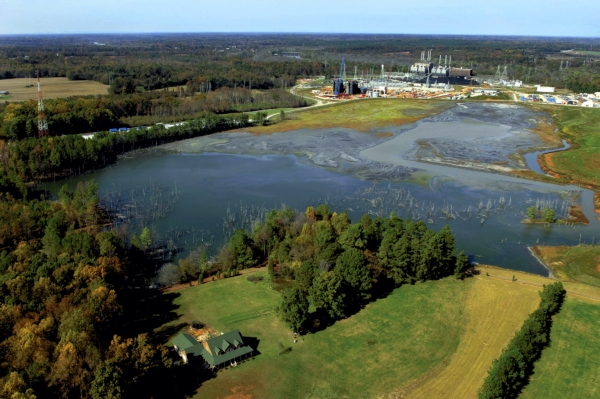Josh Bergeron: Rowan should tune back into Duke Energy’s coal ash decisions
Published 12:01 am Sunday, April 28, 2019

- A November 2010 aerial photograph of the first holding basin that was being used to hold the coal ash from the coal-fired Buck Steam plant seen in the background. JON C. LAKEY / SALISBURY POST
“Extremely expensive” were among the first words Duke Energy used Friday to describe an order by the Department of Environmental Quality to dig up coal ash at nine coal ash basins across the state.
The order, as currently written, could result in $4 billion to $5 billion in “additional and unnecessary costs,” the company said in the announcement appealing DEQ’s order. And the company’s announcement included a quote from its North Carolina President Stephen De May in which he said, “We are compelled to appeal this order, which is not supported by the scientific evidence, has significant procedural errors and would impose tremendous costs on customers without any measurable benefit.”
As if written by a partisan, the announcement further said, “Approved by the U.S. Environmental Protection Agency under the Obama administration, capping and monitoring is a far less expensive option.”
Many Rowan residents tuned out coal ash news long ago, as the ponds that served the now-demolished Buck Steam Station will be excavated as a result of a 2016 settlement. But, with the possibility Duke might ask for another rate hike for coal ash cleanup, it’s a good time to tune back in.
The latest flare-up over coal ash cleanup concerns the Allen, Belews Creek, Cliffside/Rogers, Marshall, Mayo and Roxboro facilities. On April 1, DEQ said excavation of all six sites was the only option that meets the requirements of state law to best protect public health.
And in an editorial board meeting this week with the Salisbury Post, DEQ Secretary Michael Regan said his staff “took a close look at the science” in ordering the closures. DEQ also used some of Duke’s own groundwater models, Regan said.
He said it’s “nearly impossible” to ensure groundwater carrying chemicals from coal ash ponds would not reach nearby residents.
Duke also cited review by scientists and engineers for its argument that capping in place is safe. The company argues that there’s “no measurable benefit” to excavating and more potential environmental harm.
Rowan residents, especially those in the Dukeville area, might consider Duke’s statements comical. State legislators passed a law requiring Duke Energy to extend a water line or provide another permanent source of safe water to coal ash neighbors over concerns that drinking water was contaminated by chemicals from coal ash. Excavating coal ash and moving it to a lined landfill ensures there’s no future problems with water quality.
Fortunately, coal ash cleanup questions are wrapped up in Rowan. A lawsuit filed by the Yadkin Riverkeeper produced a settlement requiring coal ash to be excavated and recycled. Alternatively, the ash can be placed in a lined landfill separated from groundwater and way from the river.
Duke says grading on a coal ash recycling plant is 90% complete at the Buck site in Rowan County. Assembly of the recycling unit will begin in mid-May.
Also next month, the company plans to begin using a new road that will take plant traffic off of Dukeville Road, a residential area.
The company is on track to begin operation of the recycling unit in spring 2020.
But the proposition that ratepayers will, as Duke says, be “burdened with billions in additional costs” may be cause for renewed activism in Rowan.
Regan told the Post that the 2014 Coal Ash Management Act, which set the state on its current path toward cleanup after an environmental disaster on the Dan River, did not ask DEQ to take costs into consideration when deciding on closure methods.
“The company has indicated that ratepayers will bear the cost and I think that’s premature,” he said.
Regan’s job isn’t approving, changing or denying rate hike requests from utilities like Duke — that falls to the N.C. Utilities Commission — but he’s right. And whether or not it’s prescribed by law, costs should not be a primary, secondary or tertiary factor in deciding whether a closure method is the right choice.
Once closure methods are finalized, should ratepayers be on the hook?
North Carolinians of all stripes would likely say “no,” pointing to the $2.7 billion in net income the company made 2018.
And two sentences in a 2018 ruling by the N.C. Utilities Commission provides hope it might say “no,” too.
“The commission’s order also denies (Duke Energy Carolinas) request for the recovery in this rate case of the company’s ongoing coal ash remediation costs,” the ruling stated. “Instead, (Duke) is authorized to record these costs … until its next general rate case, at which point the costs will be carefully scrutinized to determine the extent to which recovery from customers is appropriate.”
Because of Duke’s insistence that cleanup is part of the cost of providing energy and that excavation is “extremely expensive,” now is the time for Rowan County to watch whether DEQ’s order is upheld and be prepared to speak up if the company asks for a coal ash-related rate increase.
Josh Bergeron is editor of the Salisbury Post.


